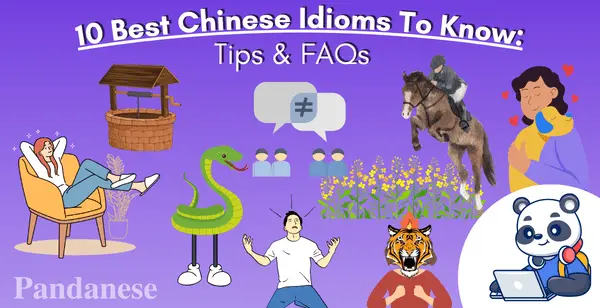
10 Best Chinese Idioms To Help You Memorize Chinese Characters
Chinese idioms, also known as "chengyu," are notorious for being some of the most challenging aspects of learning the Chinese language. For those who have spent years living in China or studying the language, idioms can still pose a formidable challenge.
However, mastering Chinese idioms is crucial to becoming fluent in the language.
In this article, we'll dive into everything you need to know about Chinese idioms and offer practical tips to help you master this challenging aspect of the language.
What are Chinese idioms?
Idioms are figurative phrases or expressions. For example, in English, the expression to kill two birds with one stone does not actually mean killing two birds with a stone. Instead, the meaning is to do two things in one single action.
In the written and spoken language of Chinese, 成语 (chéngyǔ) or Chinese idioms function with a similar purpose, and they are not words from modern Chinese. They originate from classical Chinese. In English, the term 成语 (chéngyǔ) can be directly translated as "already made words" or "formed words."
Chinese idioms come from ancient myths, fairy tales, folktales, philosophical musings, and poetry.
Chinese idioms are a testament to the longevity and stability of this language.
Why are Chinese idioms important?
While idioms may not necessarily be the most important thing in other languages, and most are thousands of years old, they are an internalized element used daily in Chinese.
Around 5,000 to 20,000 Chinese idioms are used in daily conversation, Chinese online forums, and internet chat rooms.
Chinese idioms don't just allow you to write and speak fluently. They also express information it is impossible to mimic in other languages. As you continue learning, you'll find that some things can only be communicated in Mandarin using idioms!
10 popular Chinese idioms you need to know
Here are the most popular Chinese idioms used by natives today.
1. 心旷神怡 (xīn kuàng shén yí)—to feel relaxed and happy
This idiom means to feel relaxed, happy, and carefree.
It often describes a peaceful and content state of mind, where one's worries and stresses have dissipated.
2. 爱屋及乌 (ài wū jí wū)—"love me, love my dog"
This idiom literally translates to "Love me, love my dog."
It means that if someone loves and accepts another person, they must also accept everything associated with that person, including their flaws and mistakes.
3. 无事生非 (wú shì shēng fēi)—to make trouble out of nothing
The meaning behind this phrase is to make trouble out of nothing, and this idiom describes someone who likes to stir up conflicts or create problems where there are none.
4. 画蛇添足 (huà shé tiān zú)—"to draw legs on a snake"
This idiom means "to draw legs on a snake," and it refers to doing something unnecessary or adding unnecessary steps. But, this idiom may detract from the original purpose.
5. 狐假虎威 (hú jiǎ hǔ wēi)—"to borrow the tiger's ferocity"
This idiom means "to borrow the tiger's ferocity."
It describes a situation where someone uses another person's power, influence, or reputation to intimidate others.
6. 井底之蛙 (jǐng dǐ zhī wā)—"a frog at the bottom of the well"
This idiom's literal translation is "a frog at the bottom of the well."
But it actually refers to someone who has a narrow or limited perspective and lacks knowledge or experience beyond their immediate surroundings. If the person is the frog, they can only see the sky when they look up.
7. 走马观花 (zǒu mǎ guān huā)—"to view flowers while riding a horse"
This idiom means "to view flowers while riding a horse." It describes an impatient person or someone who is easily distracted and does not fully appreciate things.
You can see the meaning if the person you are describing is one riding the horse as they can not view or appreciate the flowers passing by.
8. 天下无敌 (tiān xià wú dí)—"invincible under the heaven"
The translation of this idiom means "invincible under the heaven." It is used to describe such a person who is unbeatable or something unsurpassable.
9. 自相矛盾 (zì xiāng máo dùn)—self-contradictory; to contradict oneself
This idiom means self-contradictory or to contradict oneself. It is often used to describe a statement, idea, or argument that contains conflicting or inconsistent elements.
10. 无风不起浪 (wú fēng bù qǐ làng)—"no wind, no waves"
This idiom means "No wind, no waves." It implies that rumors and accusations have some truth in them. So when there's smoke, there is fire.
How to memorize Chinese characters with idioms
1. Read stories on Chinese proverbs
If you want to learn Chinese idioms, don't bore yourself to death with Chinese textbooks or lectures. Instead, get some storybooks with pictures, such as comics or children's stories, or watch some animations about them.
Classic idioms and Chinese proverbs like "熟能生巧 (shú néng sheng qiǎo)—Practice makes perfect," comes from a story called "卖油翁 (mài yóu wēng)" written by "欧阳修 (ōu yángxiū)" during the Song dynasty.
Knowing the background of these idioms can help visualize their true meanings and when to use them.
Another example would be the idiom,"画蛇添足 (huà shé tiān zú)," that originates during the Warring States Period. At the time, a man was offering a sacrifice to his ancestors and gave his servants a beaker of wine.
The servants drew snakes on their cups; whoever finished drawing first would get the wine. One servant added feet to his snake, but another finished before him and drank the wine, saying, "A snake doesn't have feet. How can you add feet to a snake?"
And so, this idiom describes someone doing unnecessary stuff and ruining a perfectly good thing.
2. Breaking down the components of the Chinese idiom
Here's another cool trick to help you break a Chinese idiom into more manageable parts.
First off, let's take the classic idiom "熟能生巧 (shú néng sheng qiǎo)—practice makes perfect." This idiom can be broken down into two characters with their meaning:
熟能 (shú néng): "become skilled at" or "be good at"
生巧 (shēng qiǎo): "create cleverness" or "generate skillfulness"
Practice is the key to becoming skilled at something, and this idiom emphasizes the importance of persistence and repetition in achieving mastery.
Let's try another idiom: "画蛇添足 (huà shé tiān zú)." This idiom can be broken down into three characters with their meaning:
画 (huà): "to draw"
蛇 (shé): "snake"
添足 (tiān zú): "add feet"
So the meaning behind this idiom is that drawing a snake and then adding feet to it is unnecessary and ruins the whole picture.
By breaking down the idiom into small parts, it becomes easier to understand the symbolic meaning of each one.
3. Practice using mnemonics technique with Pandanese
Last but not least, if you want an effective and science-based method to help you understand and remember Chinese idioms, consider Pandanese. This online platform and Pandanese App specializes in teaching the Chinese language through the use of mnemonics.
Mnemonics are memory devices that help learners remember information more easily. A type of learning style that Pandanese uses that often involves creating a story or a visual representation that connects the idiom's meaning to the characters used in the phrase. It is a powerful manner to help you easily understand and remember the meanings of Chinese idioms and expressions.
Frequently asked questions
How did Chinese idioms originate?
The origins of Chinese idioms can be traced back to ancient China, where they were called "chéng yǔ" (成语). Legend has it that they were first used by the legendary Yellow Emperor, who wanted to teach his people about morality and ethics in Chinese history.
Over time, chengyu became an essential part of the Chinese language and culture as seen in poetry, literature, and everyday conversation, to convey complex ideas in just a few words.
Chinese people take chengyu seriously, so mastering them is considered a sign of intelligence and education.
Ancient Chinese idioms vs. modern Chinese idioms
The world of Chinese idioms is divided into two main categories: ancient chengyu and modern chengyu.
Each category has its own unique characteristics and nuances that are important to understand for any learner of the Chinese language.
Ancient chengyu
Ancient chengyu have been around for centuries and are rooted in classical literature and historical events. These idioms often conveyed profound ideas or captured a particular moment's essence. Their meanings are clear and straightforward, making them relatively easy to understand.
For example, "fú yīng qí xīn" (服膺其心) meant to win someone's heart through service and dedication.
Modern chengyu
On the other hand, modern chengyu are often based on contemporary events or popular culture, and their meanings can be more ambiguous. For example, "diǎn shuǐ bù lòu" (点水不漏) literally means "not a drop of water spills," but it's used to describe a meticulous person.
What are the literal and figurative meanings of Chinese idioms?
The literal meaning of a chengyu is the surface-level meaning of the phrase, based on the individual characters' meanings.
The figurative meaning of a chengyu is the deeper, more abstract meaning that it conveys, as it requires an understanding of Chinese culture, history, and language to comprehend fully.
For example, the literal translation of the Chinese idiom "mǎ dào chéng gōng" (马到成功) is "horse arrives at success." However, figuratively, it describes someone who succeeded quickly, just like a horse.
Understanding these figurative meanings of Chinese idioms is crucial to mastering the Chinese language and culture. It requires a deep appreciation of Chinese history, literature, and philosophy. The meanings of chengyu are not always apparent at first glance based on its literal translation. Still, practice and knowledge are powerful tools for understanding its culture and communication.
Final thoughts
Mastering Chinese idioms is not a mystery or magical skill. Using logical and easy-to-remember techniques, anyone can start memorizing Chinese characters like a boss.
But here's the thing—simply memorizing the meaning of an idiom won't make you fluent in Chinese overnight. Learning a language is a gradual process that requires consistent effort and practice. So, in addition to memorizing idioms, it's important to immerse yourself in the language as much as possible.
One great way to do this is by reading or watching Chinese stories using idioms. Doing this will teach you new Chinese expressions and vocabulary to understand how the language is used in context.
And don't worry if you don't understand everything at first—remember, learning a language is a gradual process. By letting the language enter your brain naturally, you will gradually get used to saying it and expand your vocabulary.
Embrace the fun and quirky stories that come with them, and watch as your understanding of the language grows stronger with each new expression you learn.
The easiest way to learn Chinese & build vocabulary

